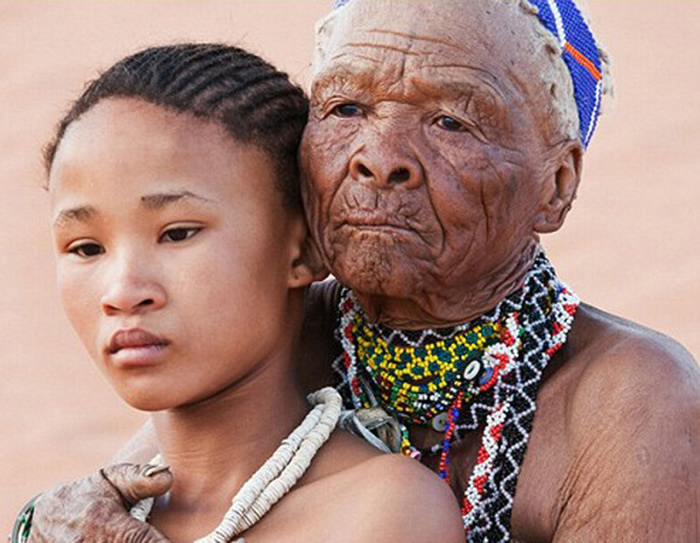 |
| San grandmother and her granddaughter. |
The San, also known as Bushmen or Basarwa, are directly descended from the original population of early human ancestors who gave rise to all other groups of Africans and, eventually, to the people who left the continent to populate other parts of the world.
A study of 121 distinct populations of modern-day Africans has found that they are all descended from 14 ancestral populations and that the differences and similarities of their genes closely follows the differences and similarities of their spoken languages.
The scientists analysed the genetic variation within the DNA of more than 3,000 Africans and found that the San were among the most genetically diverse group, indicating that they are probably the oldest continuous population of humans on the continent – and on Earth.
The research, published in the online journal Science also showed that nearly three-quarters of African-Americans can trace their ancestry to West Africa.
The 10-year-study was led by Professor Sarah Tishkoff, a geneticist at the University of Pennsylvania.
She trekked across remote and dangerous areas of the continent with an international team collecting DNA samples from more than 3,000 modern Africans from 121 distinct populations.
Often working in primitive conditions, the researchers sometimes had to resort to using a car battery to power their equipment.
The tests revealed they had all descended from just 14 ancestral populations, and the languages they spokes were closely correlated with the variation of their genes.
The study also suggests that a small group of 150 Africans, who went on to populate the rest of the world, first left their continent from the Red Sea.
The researchers also found genetic markers in the DNA of the present-day inhabitants of North, Central and East Africa.
"The human genome describes the complexity of our species," said Muntaser Ibrahim of the department of molecular biology at the University of Khartoum, Sudan.
"Now we have spectacular insight into the history of the African population ... the oldest history of mankind. Everybody's history is part of African history because everybody came out of Africa."
Before this study very little was known about the genetic variation in Africans, knowledge that is vital to understanding why diseases have a greater impact in some groups than others and in designing ways to counter those illnesses.
Scott M. Williams of Vanderbilt University noted that constructing patterns of disease variations can help determine which genes predispose a group to a particular illness.
This study "provides a critical piece in the puzzle. For example, there are clear differences in prevalence of diseases such as hypertension and prostate cancer across populations," Mr Williams said.
Christopher Ehret from the University of California, Los Angeles, compared genetic variation among people to variations in language.
There are an estimated 2,000 distinct language groups in Africa broken into a few broad categories, often but not always following gene flow.
Movement of a language usually involves arrival of new people, Mr Ehret noted, bringing along their genes.
But sometimes language is brought by a small 'but advantaged' group which can impose their language without significant gene flow.
West Africans speaking the Niger-Kordofanian language were found to share many genetic traits with African-Americans, indicating they were the ancestors of most of the slaves sent to the New World.
They also have between 13 per cent and 15 per cent European ancestry and a smaller amount of other African origins.
"There was 'very little' evidence for American Indian genes among African-Americans," Tishkoff said.
Ehret added that only about 20 per cent of the Africans brought to North America made the trip directly, while most of the rest went first to the West Indies.
And, he added, some local African-American populations, such as the residents of the sea islands off Georgia and South Carolina, can trace their origins to specific regions such as Sierra Leone and Guinea.
The study was funded by the National Cancer Institute, the National Institutes of Health, the Advanced Computing Center for Research and Education at Vanderbilt University, the L.S.B. Leakey and Wenner Gren Foundation, the National Science Foundation, the David and Lucile Packard and Burroughs Wellcome foundations.
